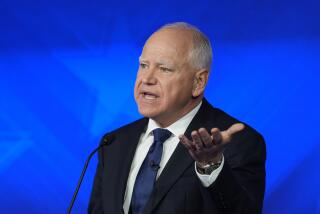Dissident Set Free by China Flies to U.S.
- Share via
BEIJING — In a move timed to smooth the way for a June summit with President Clinton, China today released 1989 student demonstration leader Wang Dan and allowed him to travel to the United States.
As was the case in the release last year of longtime dissident Wei Jingsheng, the Chinese government explained that Wang was released on “medical parole.” Wang’s family said the former history student was suffering from laryngitis and stomach and prostate ailments.
Following Wei’s release, Wang was the most prominent dissident in China, where he was serving an 11-year jail term on charges of subversion.
Surrounded by secrecy, Wang was placed aboard a Northwest Airlines nonstop flight from Beijing to Detroit this morning.
The release came after persistent pressure from Washington to free the 28-year-old activist ahead of Clinton’s state visit to China.
While Wang’s release was widely expected to come soon before or after Clinton’s visit, Chinese Foreign Ministry spokesmen had repeatedly denied that any deal was possible.
Wang’s mother, Wang Lingyun, said her son “wanted to get medical treatment and further his studies,” she told Reuters news agency. “But he also said he hoped to return one day to his own country.”
Wang’s release follows an apparent pattern in the way the Chinese government has dealt with dissidents: jailing them at home or exiling them abroad to minimize their influence on domestic politics.
Until recently, Wang had refused official offers to leave the country.
“If I were to go abroad at this moment, I might be able to lead a more safe and comfortable existence, but at the same time I would lose my spiritual sustenance,” Wang wrote several years ago.
Wang spent four years in jail after the Tiananmen Square assault and was paroled in 1993. But Chinese police arrested him again on Oct. 3, 1996, on charges of plotting to subvert the government, after 17 months of detention without charges. He was found guilty after a five-hour trial and sent to a prison in Liaoning province. His imprisonment triggered international condemnation.
The trial was the first of a prominent dissident under China’s revised criminal code. The code replaced the rubric of “counterrevolution” with the less ideologically charged crimes of endangering state security and conspiring to overthrow the government, with which Wang was charged.
But human rights activists say that despite the new legal terminology, Wang’s case was essentially no different from those of hundreds of thousands of Chinese who were arrested or persecuted for criticizing the government during almost three decades of Chairman Mao Tse-tung’s rule.
In its indictment of Wang, the state claimed that articles and petitions Wang had written had attacked the Communist Party’s leadership enshrined in China’s Constitution. Such comments, authorities claimed, had “influenced public opinion toward overthrowing the state’s power and the socialist system.”
The state added that Wang had slandered the government and written in one article that China’s constitutional guarantee of free speech had become “an empty phrase.” The state’s accusation neatly validated Wang’s claim.
Wang was also found guilty of associating with “hostile elements,” including celebrity dissident Wei, and accepting financial assistance from overseas dissidents who helped Wang pay for a correspondence course in Western history at UC Berkeley.
The government’s attacks on Wang came despite his moderate position within China’s democracy movement. Wang’s public speeches and writings argued for human rights in a rational and humble voice, as critical of the student protesters as of the government that shot them down.
In 1994, Wang wrote: “The greatest obstacle facing China’s pursuit of democratization is not the totalitarian system and the organizations that represent it but the lack of a strong democratic base.”
Born to a family of academics in 1970, the young Beijing University history major rose to the forefront of the 1989 student movement and became head of the Autonomous Student Assn., which was later outlawed by the government.
Wang urged student protesters to leave Tiananmen Square and return to their schools to build democracy, starting at the campus level. But more radical voices prevailed as debate split the student movement. Following the June 4 crackdown, Wang was at the top of the government’s most-wanted list.
Tempest is The Times’ Beijing bureau chief; Kuhn is a special correspondent.
More to Read
Sign up for Essential California
The most important California stories and recommendations in your inbox every morning.
You may occasionally receive promotional content from the Los Angeles Times.










